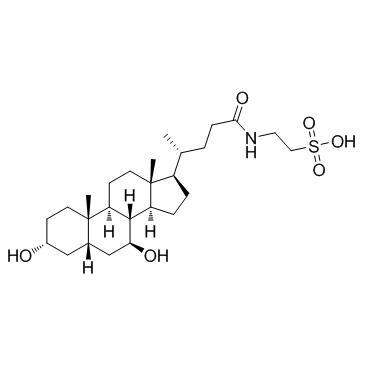14605-22-2
| Name | Tauroursodeoxycholic Acid Dihydrate |
|---|---|
| Synonyms |
2-[[(4R)-4-[(3R,5S,7S,8R,9S,10S,13R,14S,17R)-3,7-dihydroxy-10,13-dimethyl-2,3,4,5,6,7,8,9,11,12,14,15,16,17-tetradecahydro-1H-cyclopenta[a]phenanthren-17-yl]pentanoyl]amino]ethanesulfonic acid
3α,7β-Dihydroxy-5β-cholan-24-oic Acid N-(2-Sulfoethyl)amide Dihydrate 2-{[(3α,7β)-3,7-Dihydroxy-24-oxocholan-24-yl]amino}ethanesulfonic acid Tauroursodeoxycholic acid sodium salt MFCD00069496 Ethanesulfonic acid, 2-[[(3α,5β,7β)-3,7-dihydroxy-24-oxocholan-24-yl]amino]-, sodium salt (1:1) 3α,7β-Dihydroxy-5β-cholan-24-oic acid N-(2-sulfoethyl)amide Tauroursodeoxycholic acid dihydrate Sodium tauroursodeoxycholate Sodium 2-{[(3α,5β,7β)-3,7-dihydroxy-24-oxocholan-24-yl]amino}ethanesulfonate TAUROURSODEOXYCHOLIC ACID |
| Description | Tauroursodeoxycholate is an endoplasmic reticulum (ER) stress inhibitor. Tauroursodeoxycholate significantly reduces expression of apoptosis molecules, such as caspase-3 and caspase-12. Tauroursodeoxycholate also inhibits ERK. |
|---|---|
| Related Catalog | |
| Target |
ERK Caspase-3 Caspase-12 Human Endogenous Metabolite |
| In Vitro | Tauroursodeoxycholate (TUDCA) suppresses both viability and migration of vascular smooth muscle cells (VSMCs) through inhibition of ERK phosphorylation, by induction of mitogen-activated protein kinase phosphatase-1 (MKP-1) via PKCα. Tauroursodeoxycholate inhibits both the proliferation and migration of VSMCs via inhibition of ERK, through Ca2+-dependent PKCα translocation. Tauroursodeoxycholate prevents platelet-derived growth factor (PDGF) and vascular injury-induced MMP-9 expression. The knock-down of MKP-1 using specific si-RNA restores the reduced VSMC viability by Tauroursodeoxycholate (200 μM), which suggests that anti-proliferative effect of Tauroursodeoxycholate depended on the MKP-1 expression[1]. |
| In Vivo | The effects of Tauroursodeoxycholate (TUDCA) on proliferation and apoptosis of VSMCs in vivo are examined using immunohistochemistry for proliferating cell nuclear antigen (PCNA) and the transferase dUTP nick-end labelling (TUNEL) assay. Tauroursodeoxycholate (10, 50, and 100 mg/kg) increases the caspase 3 activity of injured tissues in a dose-dependent manner, indicating that Tauroursodeoxycholate induces apoptosis of VSMCs in the neointima. Using the injured tissues, further examination and comparison of the phosphorylation level of ERK and MMP-9 expression is performed at 1 week after injury, compared with normal controls. Balloon injury increased both the phosphorylation of ERK and expression of MMP-9 in the tissues. Tauroursodeoxycholate (10, 50, and 100 mg/kg) inhibits phosphorylation of ERK and MMP-9 expression in a dose-dependent manner[1]. Tauroursodeoxycholate (TUDCA) is a hydrophilic bile acid. Tauroursodeoxycholate as a cytoprotective agent improves liver function and can prevent hepatocellular carcinoma by reducing ER stress and apoptosis. Tauroursodeoxycholate significantly reduces expression of apoptosis molecules, such as caspase-3, caspase-12, C/EBP homologous protein, c-Jun N-terminal kinase (JNK), activating transcription factor 4 (ATF4), X-box binding protein (XBP), and eukaryotic initiation factor 2α (eIF2α) in Ang II induced ApoE-/- mice (p<0.05). Tauroursodeoxycholate reduces Angiotensin (Ang) II induced abdominal aortic aneurysm (AAA) formation in ApoE-/- mice. Tauroursodeoxycholate is used at a dose of 0.5 g/kg/day in treating Ang II induced ApoE-/- mice (ER stress inhibitor group). Systolic blood pressure (141.3±5.6 mmHg vs 145.9±8.9 mmHg; p>0.05) and total cholesterol levels (663.6±88.7 mg/dL vs 655.7±65.4 mg/dL; p>0 .05) do not differ between the AAA model group and Tauroursodeoxycholate group. In addition, maximum aortic diameter is significantly smaller in those in Tauroursodeoxycholate group compared with those in the AAA model group (0.95±0.03 mm vs 1.79±0.04 mm; p<0.05). AAA lesion areas are also smaller in those in Tauroursodeoxycholate group than in those in the AAA model group (0.37±0.03 mm2 vs 1.51±0.06 mm2; p<0.05)[2]. |
| Cell Assay | Cell viability and proliferation are measured using Ez-Cytox. VSMCs (5×103 cells) are seeded onto 96-well plates in Smooth Muscle Cell Growth Medium 2 (SMCGM2) and cultured. After serum starvation, Tauroursodeoxycholate (0, 50, 100, and 200 μM) is added to the hVSMCs, with or without 1,2-bis(o-aminophenoxy) ethane-N,N,N′,N′-tetraacetic acid tetra(acetoxymethyl) ester (BAPTA, 10 μM) and 7-hydroxystaurosporine (H7, 10 μM) and cultured for 24 h. To assess the effect of Tauroursodeoxycholate on the PDGF-stimulated hVSMC proliferation, hVSMCs are seeded onto 96-well plates and cultured. After serum starvation, Tauroursodeoxycholate (0, 50, 100, and 200 μM) is added to the hVSMCs, with or without PDGF-BB (50 ng/mL) and cultured. After addition of 10 μL of Ez-Cytox into each well, cell viability is evaluated by measuring the optical density at 450 nm[1]. |
| Animal Admin | Rats[1] Sprague-Dawley rats are anaesthetized with a combined anaesthetic (Ketamine, 70 mg/kg; Xylazine, 7 mg/kg ip). Tauroursodeoxycholate is administered orally once a day, in different concentrations (i.e. vehicle, 10, 50, and 100 mg/kg) for 2 weeks. The carotid arteries are fixed by perfusion with 4% formaldehyde, then the tissues are embedded in paraffin, and sections (8 μm) are stained with H&E[1]. Mice[2] Thirty ApoE-/- C57BL/6 male mice aged 8 weeks are randomly divided into three groups (n=10 in each group): (i) sham operated and injected with physiologic (0.9%) saline as vehicle (normal: group); (ii) mini-osmotic pumps are implanted subcutaneously into the right flank of ApoE-/- mice to release Ang II (1000 ng/kg/min) over the course of 28 days (AAA model group); (iii) AAA model mice treated with Tauroursodeoxycholate daily for 4 weeks at a dosage of 0.5 g/kg/day in drinking water (Tauroursodeoxycholate group). Mice are sacrificed after 28 days of Ang II infusion[2]. |
| References |
| Density | 1.2±0.1 g/cm3 |
|---|---|
| Boiling Point | 496.4ºC at 760mmHg |
| Melting Point | 173-175°C |
| Molecular Formula | C26H45NO6S |
| Molecular Weight | 499.70 |
| Flash Point | 214.2ºC |
| PSA | 132.31000 |
| LogP | 2.10 |
| Index of Refraction | 1.552 |
CHEMICAL IDENTIFICATION
HEALTH HAZARD DATAACUTE TOXICITY DATA
|
| Personal Protective Equipment | Eyeshields;Gloves;type N95 (US);type P1 (EN143) respirator filter |
|---|---|
| Safety Phrases | S22-S24/25 |
| RIDADR | NONH for all modes of transport |
| WGK Germany | 2 |
| RTECS | KI7372500 |


